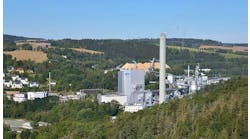Gas Technology Institute (GTI), Southwest Research Institute, GE Global Research (GE), and the U.S. Department of Energy/National Energy Technology Laboratory (DoE/NETL) broke ground Oct. 15 on the $119 million Supercritical Transformational Electric Power (STEP) Demo pilot plant at SwRi's facility in San Antonio, Texas. The partners report that STEP Demo is a first-of-its-kind, 10-megawatt, supercritical carbon dioxide (sCO2) facility that will demonstrate the next generation of higher-efficiency and lower-cost electric power technology. Construction is scheduled to be completed in 2020.
“We’re reaching a milestone in the future of power plant technology, thanks to the vision, technical expertise and determination of GTI, SwRI and GE Global Research. Their efforts will help lay the groundwork for even wider deployment of supercritical CO2 power cycles—and that means a smaller footprint, higher efficiency, reduced water usage, lower CO2 emissions and less expensive power generation,” says Steven Winberg, DoE assistant secretary of fossil energy. “With this pilot plant, the technology is moving from the lab to the field. This project will provide important data on the potential challenges of operating the technology on a larger scale.”
David Carroll, president and CEO of GTI, adds: “GTI is pleased to lead advancement of this transformational technology for clean power generation. STEP Demo will demonstrate a fully integrated power plant to generate electricity with dramatically improved efficiencies, economics and environmental performance. We're excited to bring together key government and industry partners, leveraging our collective skills and expertise in this important project to benefit consumers, industry and the nation.”
The partners explain that about 60% of all power in North America comes from burning of fossil fuel. However, most U.S. power plants are close to 30 years old, with many operating at only 35% efficiency or less, while creating significant greenhouse gas emissions from burning large amount of hydrocarbon fuels.
They add that STEP Demo is designed to address these challenges with efficiency increases approaching 10%. GTI, SwRI and GE are reported to be leaders in sCO2 power cycles, and have conducted more than two dozen related DoE projects.
“The STEP pilot plant is the home of a truly innovative technology developed in Texas that is about to change the way we think about power generation,” said SwRI President Adam Hamilton. “This new facility’s ability to generate power in a way that is more efficient, cost-effective and less harmful to the environment is remarkable. This project has the potential to revolutionize the industry as we know it.”
Because sCO2 is carbon dioxide that's held above a critical temperature and pressure, it acts like a gas while having the density of a liquid. It’s also nontoxic and nonflammable, but its supercritical state makes sCO2 a highly efficient fluid to generate power because small changes in temperature or pressure cause significant shifts in its density. Current power plants use water as a thermal medium in power cycles. Replacing it with sCO2 increases efficiency by as much as 10%. Because of the efficiency of sCO2 as a thermal medium, the partners claims that STEP turbomachinery can be one tenth the size of conventional power plant components, providing the potential to shrink the environmental footprint as well as the construction cost of any new facilities.
GTI, SwRI and GE have collaborated on the design of STEP Demo, which is also designed to evolve overtime to keep pace with industry advancements. The facility features skid-mounted components that provide flexibility and a unique reconfigurable design.
“GE scientists and engineers have turned conventional wisdom on its head by developing a desk-sized turbine that can power up to 10,000 homes,” says Todd Wetzel, power business program manager at GE Global Research. “We're excited to partner with SwRI, GTI and DoE to accelerate development of this disruptive energy technology, and explore the various ways we can use supercritical sCO2 to more efficiently generate power.”



